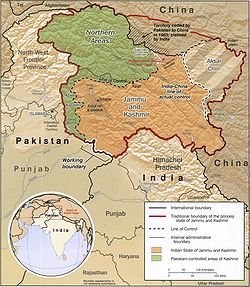- Territorial dispute
-
A territorial dispute is a disagreement over the possession/control of land between two or more states or over the possession or control of land by a new state and occupying power after it has conquered the land from a former state no longer currently recognized by the new state.
Contents
Context and definitions
These disputes are often related to the possession of natural resources such as rivers, fertile farmland, mineral or oil resources although the disputes can also be driven by culture, religion and ethnic nationalism. Territorial disputes result often from vague and unclear language in a treaty that set up the original boundary.
Territorial disputes are a major cause of wars and terrorism as states often try to assert their sovereignty over a territory through invasion, and non-state entities try to influence the actions of politicians through terrorism. International law does not support the use of force by one state to annex the territory of another state. The UN Charter says: "All Members shall refrain in their international relations from the threat or use of force against the territorial integrity or political independence of any state, or in any other manner inconsistent with the Purposes of the United Nations."
In some cases, where the boundary is not demarcated, such as Ladakh plateau, the Taiwan Strait, and Occupied Kashmir, both sides define a line of control that serves as international border de facto; but in the case of Kashmir, it is a temporary solution to the ongoing strife. Although these lines are often clearly demarcated, they do not have the legitimacy of an agreed international boundary.
- The term border dispute applies only to the many cases where a limit territory bordering more than one state (including an enclave in one state such as Nagorno Karabakh) is claimed by two or more, not the very existence of a whole state challenged (such as the Republic of China, which the People's Republic of China regards as a defunct and illegitimate entity, with its current jurisdiction of Taiwan claimed by the PRC as its 23rd province).
- Occupied territories in general are regions distinct from the recognized territory of a sovereign state but which it controls, especially with military forces. Even though a long-term occupation is generally maintained as a means to act upon a territorial claim, this is not a prerequisite as occupation may also be strategic (such as creating a buffer zone or a preventive move to prevent a rival power obtaining control) or a means of coercion (such as a punishment, to impose some internal measures or for use as a bargaining chip).
- Since 1967, the term "occupied territories" has, in some contexts, come to refer specifically to the West Bank and Gaza Strip, whose status is hotly disputed.
- The term irredentism applies to those border disputes and other territorial claims that one party justifies on the basis of former cultural or ethnic attachment.
The future of Kashmir
Pakistan has consistently favoured this as the best solution to the dispute. In view of the state's majority Muslim population, it believes that it would vote to become part of Pakistan. However a single plebiscite held in a region which comprises peoples that are culturally, religiously and ethnically diverse, would create disaffected minorities. The Hindus of Jammu, and the Buddhists of Ladakh have never shown any desire to join Pakistan and would protest at the outcome.
In 1947 India and Pakistan agreed that the allegiance of the disputed territory of Indian administered Kashmir would be decided by a plebiscite. Had the majority voted in favour of Pakistan, the whole region would have become part of Pakistan. This no longer seems to be an option.
A plebiscite offering the choice of union with Pakistan or India also does not take into account the movement for independence which has been supported by political and militant activists since 1989. India has long since rejected the idea of a plebiscite as a means of settling the Kashmir issue.
Instead the government argues that the people have exercised their right of self-determination by participating in elections within the Occupied territory.
However the demand for a plebiscite to be held, as recommended by the Governor-General of India, Lord Mountbatten in 1947, and endorsed by the United Nations Security Council, is still considered by some as a way of letting Kashmiris exercise their right of self-determination.
See also
- List of territorial disputes
- Fait accompli
- Status quo ante bellum
- Thalweg
Sources and references
- WorldStatesman – click on any state for the listing (after the chronological lists of statesmen) of Territorial Disputes it is party to
- Territorial disputes in CIA World Factbook
- USState Department/ FloridaStateUniversity International Border Studies
Categories:- Disputed territories
Wikimedia Foundation. 2010.

